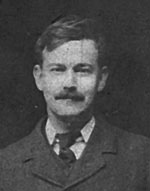| Profile | Major Works | Resources |
Richard H. Tawney, 1880-1962.

Richard Henry Tawney was born in Calcutta, India, the son of a teacher and Sanskrit scholar. R.H. Tawney was given an impeccable private education in England at Rugby school, and subsequently Balliol College, Oxford, graduating in 1903. Like several Ballliol men (e.g. Beveridge, Cole), Tawney enrolled in the Christian Social Union and would became gradually drawn into more radical socialist politics.
R.H. Tawney took up residence at Toynbee Hall, the college's social work mission house in the London East End. Tawney lived there for three years (alongside Beveridge), teaching adult education classes and became involved with the Workers Education Association (WEA). In 1906, Tawney joined the Fabian Society and became a lecturer at the University of Glasgow. But he happily gave that up in 1908 to give adult tutorial classes full time in a new experimental program had been set up by Oxford University and the WEA, in an attempt to give a university-style education to working class adults. Basing himself in Manchester from 1909 (same year he married Beveridge's sister), Tawney's WEA classes on economics and economic history were legendary. It was during this period that Tawney produced his first major economic history treatise on the Agrarian Problem (1912).
R.H. Tawney voluteered during World War I, foregoing an officer's commission to serve in the rank-and-file, and was badly wounded at the Battle of the Somme in 1916. After the war, Tawney became more deeply involved in the Labour Party, and although he failed to win election to parliamentary seats (on several attempts), he served as a Labour policy advisor, especially on education. Tawney famously authored Labour's 1922 plank on general education.
In 1920, R.H. Tawney joined the faculty of the London School of Economics (LSE) and quickly became an academic superstar with at least three highly influential books: the Acquisitive Society (1920), a classic of radical literature, Religion and the Rise of Capitalism (1926), often conjoined to Max Weber's thesis, but with substantial differences, and Equality (1930), which would become a blueprint for Labour government activism after 1945. Tawney was promoted to professor of economic history at the LSE in 1931. Tawney was also helped found the Economic History Society in 1926, and became an editor of its journal, the Economic History Review.
Unlike earlier English historicists, R.H. Tawney did not see a conflict between economic theory and economic history or engage in methodological polemics over the soul of economics. Although Tawney's opinion of economic theory was negative, he considered considered it largely irrelevant. Tawney was critical in shifting economic history away from a branch of economics to become a thing in itself.
|
Major Works of R.H. Tawney
|
|
HET
|
|
Resources on Richard Tawney
|
All rights reserved, Gonšalo L. Fonseca
